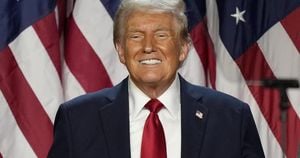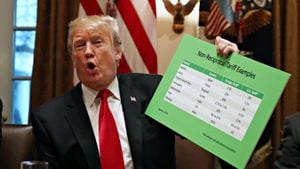Global stock markets are teetering on the edge as voters head to the polls for the 2024 U.S. presidential election, with the possibility of Donald Trump reclaiming the White House sending shockwaves through financial circles. Trade experts, currency analysts, and Wall Street strategists are all weighing the consequences of this impending electoral showdown, noting its potential to disrupt not just American economic landscapes but have ripple effects on global markets.
The polls show Trump and Kamala Harris neck-and-neck, leaving investors with heavy hearts and unsure minds. According to analysts at Westpac, the financial market could see significant fluctuations depending on the election's outcome. If Trump manages to pull off another upset win, predictions suggest the dollar could gain strength, reflecting the market's expectation of radical changes from new trade policies. Meanwhile, if Harris secures her position, many are bracing themselves for the possibility of currency weakness. The differing visions of economic management have drawn stark lines between supporters of each candidate.
Adding to the already charged atmosphere are threats directed toward both Trump and Biden, as well as Bobby Harris's notable strategic withdrawals from public support—elements likely to influence voter turnout and sentiment. The gravity of the situation is underscored by J.P. Morgan’s notes, drawing attention to the dichotomy of choosing between the familiar pathways of current policies versus the uncertain route of potential upheaval brought forth by Trump’s leadership.
Across the Pacific, the Chinese yuan is experiencing volatility, which highlights fears over what renewed tariffs from Trump could mean. Uncertainty has led Citi's currency strategists to recommend pairing currency trades such as USD/JPY and AUD/USD, dependent largely on the eventual election results. The Reserve Bank of Australia seems to be holding tight, ensuring their interest rates remain steady, likely waiting to see who emerges victorious.
Despite this uncertainty, some investors are seeking refuge, turning to alternative assets like Bitcoin. Currently, it holds steady at around $67,924, offering itself as tempting hedge against any market turmoil. Analysts suggest this trend could be bolstered if Trump’s less stringent regulatory policies take hold, allowing digital assets to flourish.
The geopolitical ramifications of this election stretch well beyond the United States. A Trump presidency could bring about seismic shifts particularly concerning U.S.-China relations, potentially igniting fresh tensions on the global stage. Conversely, Harris would likely push for more stable, methodical policies, aiming to sustain the status quo.
Even with the U.S. Treasury market remaining stable, with 10-year yields at about 4.30%, the current election climate feeds investors' anxiety. Observers note key battleground states like Pennsylvania and Arizona could sway the electoral results. The potential for delays and disputes arising from this charged atmosphere is notable, heightening the risk factors affecting market stability.
Clearly, the link between political outcomes and market health is almost inseparable as the 2024 election approaches. Economic upheaval or continuation of current trends hangs precariously on the results, leaving many – particularly those involved with business, trade, and investing – glued to their screens for updates.
The stage is undoubtedly set for what could become one of the most contentious elections America has seen. The intertwining of politics and economy is on full display, with traders and investors alike preparing for the rollercoaster of emotional and financial volatility leading up to and following the election.
So, what does this mean for average people and their wallets? Wait and watch is the name of the game right now. Economic indicators might sway, and people could see changes reflect immediately. The looming uncertainty around the election has become its own kind of economic force, influencing spending, investment decisions, and overall consumer confidence.
With every passing day, the tension builds, painting the economic picture with layers of unpredictability, offering both risks and potential rewards. The only certainty seems to be change, and whether people look at it with optimism or pessimism remains deeply colored by the upcoming election results. Perhaps the biggest question on everyone’s mind, should Trump swing back to power, is just how transformative his policies could be this time around, leading to real reconsiderations of how to engage with both domestic economic strategies and international relationships.



